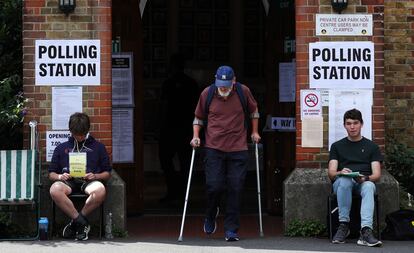Sunak’s Conservatives suffer 2 big defeats but avoid a wipeout in trio of UK special elections
The Conservatives found some crumbs of comfort in their narrow success in Uxbridge and South Ruislip in west London

Britain’s governing Conservative Party suffered two thumping defeats Friday in a trio of special elections but avoided a drubbing after holding onto former premier Boris Johnson’s seat in suburban London.
Though the main opposition Labour Party and the smaller centrist Liberal Democrats overturned massive Conservative majorities to win a seat apiece, the Conservatives found some crumbs of comfort in their narrow success in Uxbridge and South Ruislip in west London.
Still, the results of Thursday’s elections, if replicated at a likely general election next year, would certainly see Labour emerge as the biggest single party, possibly with a sizeable overall majority.
Labour won the seat of Selby and Ainsty in northern England, with the 25-year-old candidate Keir Mather managing to secure the party’s second largest swing at a special election since 1945.
“This is a historic result that shows that people are looking at Labour and seeing a changed party that is focused entirely on the priorities of working people with an ambitious, practical plan to deliver,” Labour Party leader Keir Starmer said.
Meanwhile, the Liberal Democrats took Somerton and Frome in southwest England on a similarly large swing away from the Conservatives.
“The people of Somerton and Frome have spoken for the rest of the country who are fed up with Rishi Sunak’s out-of-touch Conservative government,” Liberal Democrat leader Ed Davey said.
What is clear about those two elections was that voters from both opposition parties clearly backed the party most likely to defeat the Conservative candidate. Facing this level of tactical voting, the defeats will leave many Conservative lawmakers rattled ahead of the likely national vote next year.
The defeats don’t mean a change of government, since the Conservatives still have a chunky majority in the House of Commons.
For months, opinion polls have been giving Labour a double-digit lead — sometimes up to 20% — nationwide over the Conservatives, who have been in power since 2010.
The party has been plagued by the fallout from the tumultuous terms of Johnson and his successor as prime minister, Liz Truss, who quit within weeks after her plan for unfunded tax cuts alarmed financial markets, which accentuated a a cost-of-living crisis.
Johnson, who stood down as premier last September, quit Parliament last month after being accused of misleading the House of Commons over statements he made regarding the lockdown breaches. The former lawmaker in Selby, an ally of Johnson’s, followed him out the door while the member of parliament in Somerton and Frome resigned amid sex and drugs allegations.
There is speculation that Prime Minister Rishi Sunak, who has to call a general election by Jan. 2025 at the latest, could look to shake up his government with a Cabinet shuffle as early as Friday.
Much of the spotlight will turn on Labour leader Starmer, who has been cautious in laying out his plans for government.
The party’s failure to secure victory in Johnson’s former seat will likely some concern over London Mayor Sadiq Khan’s plan to expand an anti-pollution zone to all outer boroughs of the capital, a move that will see many older cars and diesel vehicles face a daily emissions charge.
Conservative ministers sought to present the overall results as mixed, arguing that many governments often suffer big defeats in special elections.
Sign up for our weekly newsletter to get more English-language news coverage from EL PAÍS USA Edition
Tu suscripción se está usando en otro dispositivo
¿Quieres añadir otro usuario a tu suscripción?
Si continúas leyendo en este dispositivo, no se podrá leer en el otro.
FlechaTu suscripción se está usando en otro dispositivo y solo puedes acceder a EL PAÍS desde un dispositivo a la vez.
Si quieres compartir tu cuenta, cambia tu suscripción a la modalidad Premium, así podrás añadir otro usuario. Cada uno accederá con su propia cuenta de email, lo que os permitirá personalizar vuestra experiencia en EL PAÍS.
¿Tienes una suscripción de empresa? Accede aquí para contratar más cuentas.
En el caso de no saber quién está usando tu cuenta, te recomendamos cambiar tu contraseña aquí.
Si decides continuar compartiendo tu cuenta, este mensaje se mostrará en tu dispositivo y en el de la otra persona que está usando tu cuenta de forma indefinida, afectando a tu experiencia de lectura. Puedes consultar aquí los términos y condiciones de la suscripción digital.








































